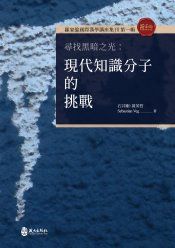
Tsuyoshi Ishii, Huang Yingzhe, Sebastian Veg, Searching for light in darkness. The challenges of modern intellectuals
This publication originated in a series of Lo-Chia-luen lectures (羅家倫國際漢學講座) I gave in 2022 at National Cheng Chi University or NCCU (in fact, after being postponed several times, they were finally delivered online because of travel restrictions). Named for the famous scholar, May Fourth student activist, and later politician Lo Chia-luen (Luo Jialun, 1897-1969), these lectures were divided into several cycles; the book brings together the three speakers who dealt with intellectuals.
Translation of the publisher’s blurb (automatic translation, revised):
The upheavals at the end of the Qing dynasty brought about a fundamental transformation in the traditional Confucian knowledge structure. The cession of Taiwan to Japan, followed by its return fifty years later, plunged the Taiwanese people into a profound sense of loss, giving rise to the impulse to treat “Taiwan” as a subject of scholarly inquiry. After the founding of the People’s Republic of China, repeated political purges and persecutions within the intellectual community led to a distorted intellectual environment under the constraints of censorship. All of these developments prompt deep reflection on the dialectical relationship between crisis and knowledge.
This book contains lecture transcripts from Professors Ishii Tsuyoshi, Huang Yingzhe, and Sebastian Veg. Each of these scholars brings their own expertise to the table, tracing a wide-ranging trajectory that spans from the late Qing and the Republican era, through the founding of the PRC, and into the post-socialist present. Their discussions cover the genealogy of academic modernization in China, the historical and political forces shaping knowledge production, and the choices and consequences faced by intellectuals situated within these processes. Together, they guide us through various strata of the “archaeology of intellectuals.”
Their reflections on “intellectuals in times of crisis” are both incisive and profound—so much so that the reader may feel a sense of empathetic resonance. For those concerned with Taiwan and the broader Chinese civilization, this book is sure to leave a lasting impression.